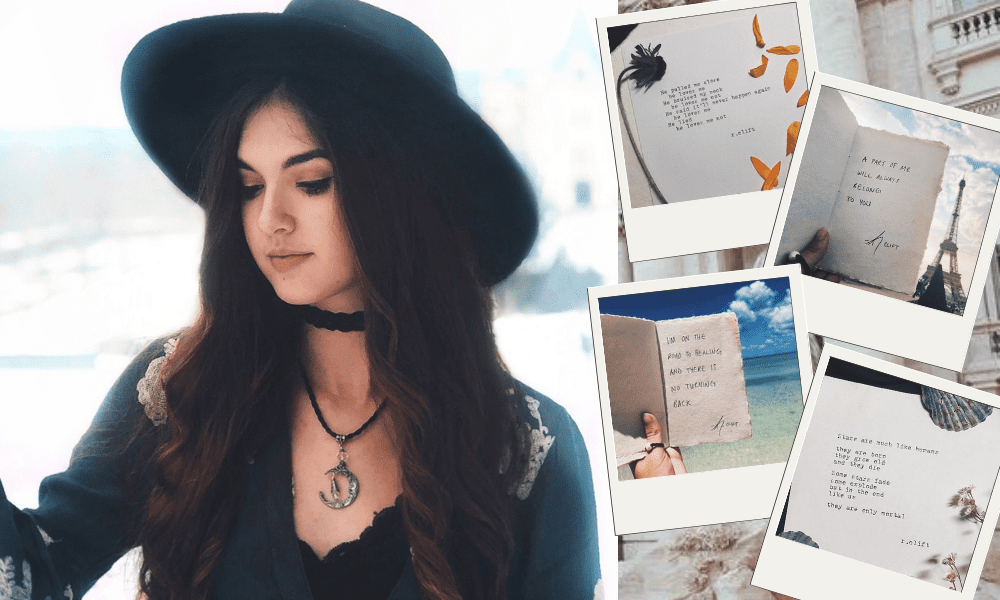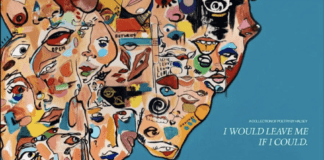
Poet R.Clift, of the popular Instagram account @R.Cliftpoetry, opens up about her journey to poetry and what’s coming soon from her brilliant, beautiful mind.
We asked her every question you’ve ever wanted to, from her decision to share her words with the world and her creative process to why she is referred to as the “constellation poet” and her opinion on the impact of social media in the poetry world. R. Clift held nothing back; you won’t want to miss this!
little infinite: What was the first moment you knew that poetry was going to be the writing style for you? What sparked it for you?
R. Clift: I began writing poetry in January of 2017 after signing up for a class at my university. It was kind of on a whim. I needed an extra credit and the class fit in my schedule. So even though I never really thought I liked poetry, I signed up. I walked into that class on the first day to meet a professor named Arthur Smith, but everyone just called him Art. He was an eccentric older gentleman who always said what was on his mind and genuinely loved teaching. It turns out I have always loved poetry, words, I just didn’t understand it. He redefined poetry for me and he helped me find my voice. He is truly the reason I am writing today.
One thing he said that I’ll always remember is “The inspiration is the best part of the poem, and you had nothing to do with it.” He didn’t only teach us rhyme scheme and iambic pentameter, he taught us that to live your life is the most important thing one can do. I wrote seventy poems in the first week of that class, it was like they had been bottled up for so long they exploded out of me once finally given the chance. Art unexpectedly passed away last November, I wish I had the chance to tell him how much he changed my life.
“I want my art, my words, my photography to ultimately make people feel something. Anything. To connect with them and help them realize that even if for only in that moment, they aren’t alone in this.”
-R.Clift Poetry
li: Writing poetry and sharing poetry are two very different things. What made you decide to write AND share your poems? What drew you to social media instead of a personal website?
RC: This is actually my favorite story to tell! The reason I started sharing is because of a few strangers I met at a music festival about a year ago. March 2018. They each, in their own way, made me come to believe that my words could mean something more to people than I ever thought possible. Before then I didn’t even call myself a poet, I hadn’t yet come to terms with claiming that title as something I had earned. They were three travelers, three writers, and they dubbed me the name “constellation poet” because of how ‘I could string words together like stars in the night sky.’
The one moment that made up my mind to start sharing to a wider audience was on a hazy, quiet sunday afternoon at the festival. That morning I had sat down with a piece of paper, began writing with the words “Dear you,” until I filled up the page, didn’t sign it, and left it on a desk in a public area.
I didn’t know who I was writing to, maybe everyone. It was a letter, urging the reader to believe that their pain has the power to help them overcome their struggles if harnessed in the right way. It was a letter telling them that they have a beautiful light within them that needs to be seen.
Hours later I returned to see if it was still there, it was, and a young couple was reading it. I sat nearby to watch how people reacted, but couldn’t really tell anything from far away. A new stranger went up to the desk a sat down, he was so tall and had dreads down to his waist, I was a bit intimidated. He sat there in gentle silence, reading, and I decided to join him. My curiosity always gets the best of me. I noticed people had left little doodles and notes on a paper next to mine, so I read those while he finished my letter. He said nothing.
Then I looked over and he was crying. I have to say, I didn’t know what to do– this huge burly man had tears rolling down his face and I didn’t know why.
He looked at me, held up my letter, and asked, “Have you read this?”
I nodded my head and he continued on to tell me that his mother had passed away recently, and this letter was exactly what he needed to hear.
What I’ll never forget is the way he looked at me when I confessed,
“I wrote that letter.” His eyes were full of so much light and sadness at the same time.
He thanked me and pulled me into a hug. I was in awe of the effect my letter had on him. I had never seen anyone’s reaction to my words before– not really, not like that.
I never learned his name, but we sat there and I held him for some time. That was when I realized I have a responsibility to share the words I write to reach those that need them the most. That was when I stopped only writing for myself, but for you, too.
li: Which poets and artists have most heavily influenced your work?
RC: Naming every artist that has influenced me would be like trying to name every star in the sky, but here are a few that have recently shined the brightest for me, and why– I love how Van Gogh kept creating even though nobody gave him a bit of recognition, I love how Michelangelo saw angels in a boring slab of marble and brought them to life, how Emily Dickinson used as many dashes as she pleased in her poetry despite grammar rules, how Shakespeare created words when he couldn’t find one in existence that was sufficient, how honest and genuine musicians like Keaton Henson, Sleeping at Last, and Daughter are with their lyrics and songs, and finally– how architects back in the thirteenth century began construction on the Duomo in Florence, but designed it with a immensely complex dome all while knowing it could not be completed in their lifetime. They had so much faith in future generations, that they left it to them to be completed decades later in the fifteenth century when Brunelleschi came up with the design and they topped the cathedral with one of the most advanced victories in the Italian architectural history of that time. All because of hope.
li: When you’re working through your creative writing process, which step is the most crucial for you? Which is the most frustrating? What do you do to get un-stuck?
RC: I hardly ever force my writing, the only time I sit down and think “I’m going to write a poem about ____” is when I’m working on a planned series. Sonnets about
The most frustrating is when I begin, and I feel like I’m not connecting any emotion to the words. If I don’t feel anything while writing it, nothing will be felt while reading it.
To get un-stuck, I walk away. I go make a cup of coffee, or call a friend, or walk outside to sit by the water. I get away, and when I come back it’s like looking at it as if for the first time. So there, we start again.
li: Is there a unique place you write, or rituals you have to get your creative process flowing?
RC: I write all over the world while I’m traveling, so there’s really no set place where I write. The poem, or the bones of it, usually appear so quickly that I type it down on my phone as to not forget. Later that poem gets transferred to my journal or typed out on a typewriter, where things might change a bit. Then there we have it, a new poem is born.
As for rituals, I suppose saying yes to new experiences. My poetry is only as real and interesting as I live my life. Just as Arthur Smith taught, you live your life first– then write the poem later.
li: I know it’s hard to choose just one, but what is your favorite thing about writing poetry?
RC: Street Poetry. Hands down. I only recently began, but sitting in my favorite bookshop, or right outside on the sidewalk, or setting up at a music festival and writing poetry for strangers is my absolute favorite thing to do. They give me a topic, it could be anything, and I write them a poem right there on the spot on one of my typewriters. To connect with people, meet them, speak with them, and write with them– it’s the best feeling in the world. If I could do that every day of my life, I would.
li: What types of poems do your fans love the most? What are some of the best discussions your poems have prompted among your community?
RC: From what I can tell, they seem to respond to love poems the most. Moreso even, the ones I wrote while brokenhearted. I suppose it’s because we all know how that feels. We want to know we’re not on our own in that feeling.
As for discussions, I really like to try and make my page a two way street. I don’t want my followers to feel like I’m a shadow, or that they aren’t worth being heard. I want to know them. I want them to know me. I try to prompt discussions by asking questions in my stories, having them write lines of poetry, encouraging them to be honest with their words. To create a space where everyone feels safe and appreciated in being heard is definitely a goal of mine.
li: How do you stay true to yourself especially now with social media impacting how poetry lovers discover poetry?
RC: I’ve found that if I am being honest with myself and my intentions daily, it is easier to stay true to who I am even with a persona hanging over my head. Social media has its good and bad, but overall if it means people are rediscovering poetry– especially young people, then it’s worth it. I know who I am at this point
li: Has a growing social media following changed the way you write or approach poetry at all?
RC: If anything, it keeps me accountable. I post once in the morning and then I try to limit how much I log on to keep myself more present in my world. So, I’ve ended up being a bit more disciplined than I used to be when it comes to social media. As for the way I write, I hope I’m growing and becoming a better poet than I was yesterday, but I don’t think that has much to do with Instagram.
li: What are your goals for your poetry this year? Do you have a creative bucket list you’re working toward? What larger impact would you like your art to make?
RC: This is actually a huge year for me! I have a lot of projects and plans in the works– even my first book. Nothing is set in stone just yet, but I would keep an eye out this summer!
As for a creative bucket list, yes– I have a lot to offer and so much more to say so my list spans over several years. I have several books planned, several series in the works, and I want to make street poetry a more regular thing. This all takes time, though. I’m fueled by ambition, passion, and lots and lots of coffee.
I want my art, my words, my photography to ultimately make people feel something. Anything. To connect with them and help them realize that even if for only in that moment, they aren’t alone in this.
To keep up with R.Clift follow her on Instagram (@r.cliftpoetry).














